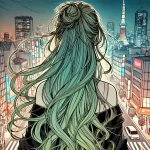オトナブルー [Otona Burū]
新しい学校のリーダーズ [Atarashii Gakkō no Rīdāzu]
Words : 新しい学校のリーダー達 [Atarashii Gakko no Ridātachi]
Music : yonkey [yonkey]
新しい学校のリーダーズ [Atarashii Gakkō no Rīdāzu] is a four-member dance vocal unit formed in 2015. They are known as “Atarashii Gakko!” overseas. Let’s first understand the Japanese meaning of this group’s name.
- 新しい(あたらしい)[atarashī] : new
- 学校(がっこう)[gakkō] : school
- リーダー(りーだー)[rīdā] : leader
So, if you omit “Leaders” and say “Atarashii Gakko,” the meaning changes. Well, that’s not important.
The group’s atmosphere, including their name, is very crazy. Their dance is quite strange, and this song is very challenging for today’s times, resembling 80s Japanese techno-pop.
They wear sailor uniforms as costumes. Although sailor uniforms were once a symbol of Japanese female school uniforms, they are now becoming somewhat outdated, as blazers overwhelmingly dominate the market. They also wear an armband like a disciplinary committee member on their left arm, which symbolizes their theme of “how to push boundaries without breaking the rules.”
Despite their fresh-sounding name, they are a bizarre group, but when you see their music and dance, you can’t help but think they are cool. Are they truly the new leaders?
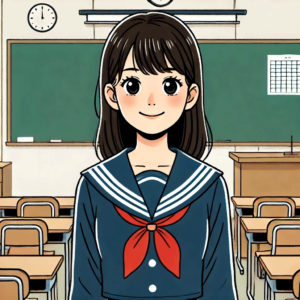
わかってる ほしいんでしょ?
wakatteru hoshīn desho
艶(つや)やかな この唇
tsuya yaka na kono kuchibiru
- わかる(わかる)[wakaru] : understand
- 欲しい(ほしい)[hoshī] : want
- 艶やか(つややか)[tsuya yaka] : glossy
- この [kono] : this
- 唇(くちびる)[kuchibiru] : lips
(translation) “I understand. You want it, right?
These glossy lips”
The provocative lyrics and strong singing style remind me of Momoe Yamaguchi.
ヤワな男たち 惹き寄せる
yawana otokotachi hikiyoseru
息を呑むほどに甘い蜜
iki o nomu hodo ni amai mitsu
- ヤワな(やわな)[yawana] : soft
- 男(おとこ)[otoko] : man
- 惹き寄せる(ひきよせる)[hikiyoseru] : attract
- 息をのむ(いきをのむ)[ikio nomu] : breathtaking
- 甘い(あまい)[amai] : sweet
- 蜜(みつ)[mitsu] : honey
(translation) “Attracting soft men
Honey so sweet it takes your breath away”
”やわ / yawa” originates from “やわらかい / yawarakai” (=soft). It’s a word you might hear in hard-boiled TV dramas or movies, but not in everyday conversation.
わかってる ほしいんでしょ?
wakatteru hoshīn desho
二度見する この躰(からだ)
nidomi suru kono karada
汗ばむ街 一人歩けば 淫らな視線が絡みつく
asebamu machi hitori arukeba midara na shisen ga karamitsuku
- 二度見(にどみ)[nidomi] : double-take
- 体(からだ)[karada] : body
- 汗ばむ(あせばむ)[asebamu] : sweaty
- 街(まち)[machi] : city
- 一人(ひとり)[hitori] : alone
- 歩く(あるく)[aruku] : walk
- 淫らな(みだらな)[midara na] : lewd
- 視線(しせん)[shisen] : gaze
- 絡みつく(からみつく)[karamitsuku] : entangle
(translation) “I understand. You want it, right?
This body that makes you double-take
Walking alone in the sweaty city, lewd gazes entangle”
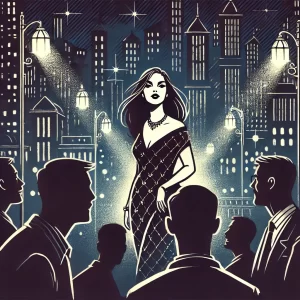
These lyrics are quite erotic. Some people might frown upon them, but please let me continue.
ねえ 何を期待してるの?
nee nani o kitai shiteru no
- ねえ [nee] : hey
- 何(なに)[nani] : what
- 期待(きたい)[kitai] : expect
(translation) “Hey, what are you expecting?”
そのうちじゃなくて 今すぐがいいの
sonouchi janakute ima sugu ga ī no
大人の恋に焦がれて
otona no koi ni kogarete
- そのうち(そのうち)[sonouchi] : eventually
- 今すぐ(いますぐ)[ima sugu] : right now
- 大人(おとな)[otona] : adult
- 恋(こい)[koi] : love
- 焦がれる(こがれる)[kogareru] : yearn
(translation) “Not eventually, but right now is better
Yearning for adult love”
見た目よりも 残るあどけない
mitame yori mo nokoru adokenai
Ah 心だけが Ah 先走る
Ah kokoro dake ga Ah sakibashiru
青い蕾(つぼみ)のまま 大人振る
aoi tsubomi no mama otonaburu
- 見た目(みため)[mitame] : appearance
- 残る(のこる)[nokoru] : remain
- あどけない [adokenai] : innocent
- 心(こころ)[kokoro] : heart
- 先走る(さきばしる)[sakibashiru] : get ahead
- 青い(あおい)[aoi] : blue
- 蕾(つぼみ)[tsubomi] : bud
- 大人(おとな)[otona] : adult
- 振る(ぶる)[buru] : act
(translation) “Still more innocent than the appearance
Ah, only the heart Ah gets ahead
Acting like an adult while still a blue bud”
This was a story about a girl acting like an adult but not fully grown up. The lyrics were quite sexy, but let’s say it was just a pretense.
“大人ぶる / Otona buru” means “to act like an adult,” and the word “ぶる / buru” has a double meaning with “ブルー / burū (blue),” creating a pun. So, it’s “Otona burū” (=Adult Blue) and “Otona buru” (=acting like an adult).
Also, blue has the meaning of young or immature in Japan which is in “a blue bud”.
By the way, they are all adults and not students. The school uniforms are cosplay.
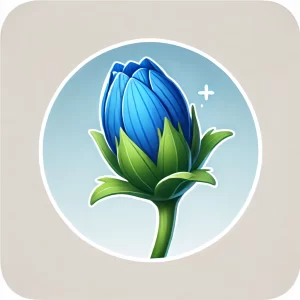
わかってる ほしいんでしょ?刺激する 私の全て
wakatteru hoshīn desho shigeki suru watashi no subete
冷めた瞳まで魅了する
sameta hitomi made miryō suru
いつかは花になるアマリリス
itsuka wa hana ni naru amaririsu
- 刺激する(しげきする)[shigeki suru] : stimulate
- 私(わたし)[watashi] : I
- 全て(すべて)[subete] : all
- 冷めた(さめた)[sameta] : cold
- 瞳(ひとみ)[hitomi] : eyes
- 魅了する(みりょうする)[miryō suru] : captivate
- いつか [itsuka] : someday
- 花(はな)[hana] : flower
- アマリリス(あまりりす)[amaririsu] : amaryllis
(translation) “I understand. You want it, right? All of my stimulating self
Captivating even cold eyes
The amaryllis will someday bloom”
“アマリリス / amaririsu (Amaryllis)” sounds very similar to “甘い蜜 / amai mitsu” which is in the previous verse. Fun.
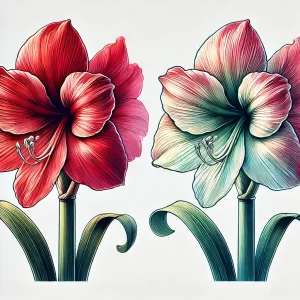
優しいだけの 言葉じゃなくて 心で繋がりたくて
yasashī dake no kotoba janakute kokoro de tsunagaritakute
ありきたりな メイクじゃ隠せない
arikitari na meiku ja kakusenai
Ah 憧れだけ Ah 夢を見る
Ah akogare dake Ah yume o miru
あなたの前で また 大人振る
anata no mae de mata otonaburu
- 優しい(やさしい)[yasashī] : gentle
- だけ [dake] : only
- 言葉(ことば)[kotoba] : words
- 繋がる(つながる)[tsunagaru] : connect
- ありきたり [arikitari] : ordinary
- メイク(めいく)[meiku] : makeup
- 隠す(かくす)[kakusu] : hide
- 憧れ(あこがれ)[akogare] : longing
- 夢(ゆめ)[yume] : dream
- 見る(みる)[miru] : see
- あなた [anata] : you
- 前(まえ)[mae] : before
(translation) “Not just gentle words, I want to connect with my heart
Can’t hide with ordinary makeup
Only longing, dreaming
Acting like an adult again in front of you”
The word “繋がる / tsunagaru” (=connect) is commonly heard these days. For example, “We are connected on Facebook.” It’s often used to describe the state of being able to contact someone through social networks.
そのうちじゃなくて 今すぐがいいの
sonouchi janakute ima sugu ga ī no
大人の恋に焦がれて
otona no koi ni kogarete
見た目よりも 残るあどけない
mitame yori mo nokoru adokenai
Ah 気持ちだけが Ah から回る
Ah kimochi dake ga Ah karamawaru
私を見つけて
watashi o mitsukete
- 気持ち(きもち)[kimochi] : feeling
- から回る(からまわる)[karamawaru] : go in circles
- 見つける(みつける)[mitsukeru] : find
(translation) “Not eventually, but right now is better
Yearning for adult love
Still more innocent than the appearance
Only feelings go in circles
Find me”
優しいだけの 言葉じゃなくて 心で繋がりたくて
yasashī dake no kotoba janakute kokoro de tsunagaritakute
ありきたりな メイクじゃ隠せない
arikitari na meiku ja kakusenai
Ah 憧れだけ Ah 夢を見る
Ah akogare dake Ah yume o miru
まだ見ぬ恋路を 追いかけて 追いかけて
mada minu koiji o oikakete oikakete
また オトナブルー
mata otona burū
- まだ [mada] : yet
- 恋路(こいじ)[koiji] : love’s path
- 追いかける(おいかける)[oikakeru] : chase
- また [mata] : again
(translation) “Not just gentle words, I want to connect with my heart
Can’t hide with ordinary makeup
Only longing, dreaming
Chasing after the unseen love’s path
Again, Otona Blue”
Earlier, I mentioned that blue means young or immature in Japan.
In the usage of blue, it also means melancholy, just like in English. In English, “blue” has an additional meaning of lewdness, which is not imported into Japanese. In Japan, lewdness is associated with pink.
The title and the last lyrics are written as “オトナブルー / otona burū (blue)” instead of “大人ぶる / otona buru (pretending to be an adult)”. In my interpretation, the girl is trying to act like an adult, but it’s not working out well. This leads to a growing sense of futility and a feeling of melancholy.
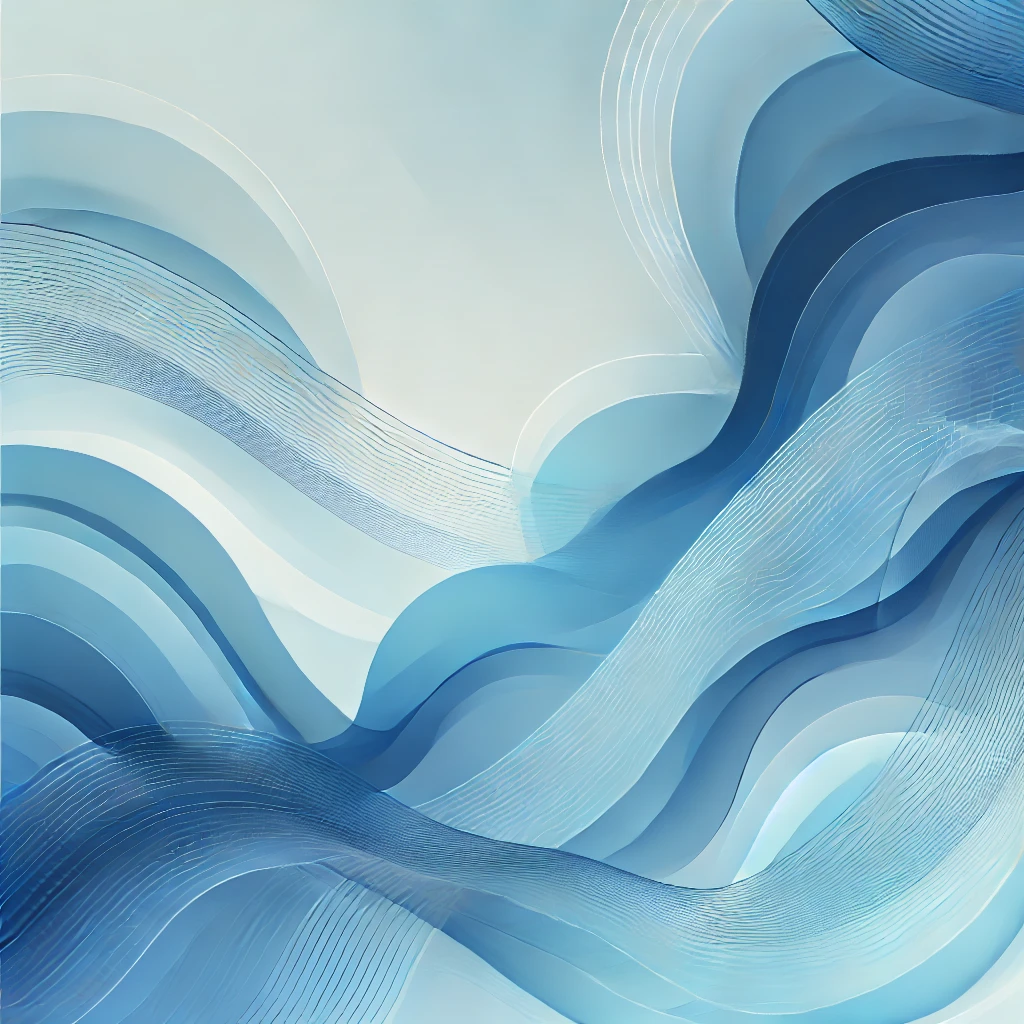
It is not at all bizarre. The lyrics were more sophisticated and showed a good understanding of Japanese usage.
Let’s watch the famous head-shaking dance.
Thanks for reading! Feel free to comment if you have any feedback or questions.
Follow me on X.



